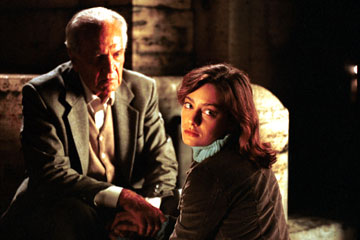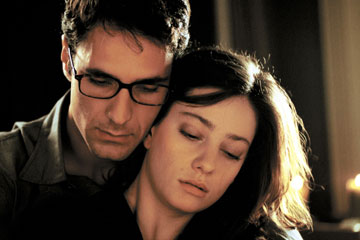Facing Windows
(La Finestra di Fronte)


Facing Windows is an interesting movie. The plot isn't that great, and despite the subdued acting tends to border on melodrama, but it still manages to hold the attention of the viewer. It also takes a while to figure out where the movie is headed, and writer/director Ferzan Ozpetek (His Secret Life, Harem Suare) takes his time in doling out answers. The most surprising element is that while the film is not bad and not great, it earned the three biggest awards at the 2003 Donatello Awards (the Italian equivalent of the Oscars), Best Actor, Actress, Film, two other awards, and seven other nominations. Coupled with the fact that it stars the extremely fetching Giovanna Mezzogiorno ensured a domestic distribution. The film starts with a young baker (Massimo Poggio, Rosa and Cornelia, Due Come Noi) in pre-World War II Italy getting into a violent fight, then abruptly drops the story in such a way that people are sure it somehow relates to the film. Ozpetek (who co-wrote the film with Gianni Romoli, His Secret Life, Harem Suare) then flashes forward to the present.
Giovanna (Mezzogiorno, The Last Kiss, The Cruelest Day) is a housewife pulled in too many directions. She likes to make fine pastries, but has to work in poultry factory to makes ends meet. Her husband Filippo (Filippo Negro, His Secret Life) works the night shift, and things are not going great between them. Moreover, they are dealing with two young children. Giovanna prefers to stare out her window at the Lorenzo (Raoul Bova, Under the Tuscan Sun, Avenging Angelo), the handsome man who lives across from her. Little does she know that he does the same to her. Her life changes when she and Filippo meet an old man (Massimo Girotti, Sunset in Venice, The Monster) who lost his memory. Against all better judgment, they take him home for the night. Giovanna, who tells Filippo to take him to the police the next day, is enraged to find him still at home when she returns from work.
The movie starts in earnest from that point. If one thinks about the plot afterwards, it seems pretty ridiculous. But again, Girotti, Mezzogiorno, and Ozpetek actually make it work to a degree. Ozpetek uses little tricks to move between the past and the present, gradually showing people the story behind the old man. Initially, he can only whisper the name "Simone" when asked about his past. Bizarrely, he begins to grow on Giovanna, especially when she learns that he has the ability to cook amazing pastries. Lorenzo eventually enters into the picture, and as the two learn more about the man's past, which involves forbidden love, it begins to mirror their own situation. Giovanna hesitates when the opportunity arises to physically cheat on Filippo. Ozpetek uses the windows to signify both voyeurism and self-examination, and often avoids lots of light in his scenes. When Giovanna is in Filippo's apartment looking out his window directly into hers, it is much more than her simply looking at her house. It often feels like Ozpetek is trying to be more profound than he actually is. The eventual revelation of the nature of the relationship behind Simone and the old man feels a tad forced, but the fact that Ozpetek can make the audience get this far without laughing aloud (Giovanna gets flak for wanting to be a cook) must say something.